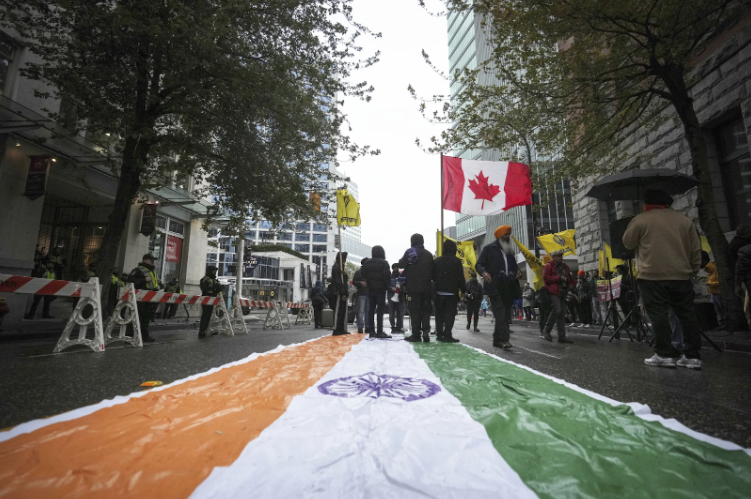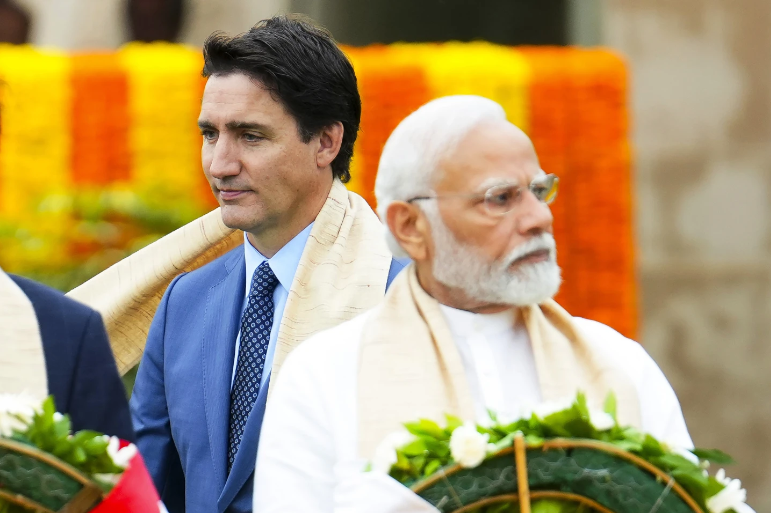India Resumes Visa Services in Canada after Diplomatic Fallout
An Indian flag is laid on the street as protesters wave Canadian and “Khalistan” flags during a protest outside the Indian Consulate in Vancouver, British Columbia, on Monday, Sept. 25, 2023. Photo: Darryl Dyck/AP
The Indian Embassy in Ottawa, Canada announced the resumption of visa services on October 25 in Canada, after a diplomatic fallout between the two countries over the last couple of months. The resumption of visa services shows tensions are decreasing which is a positive sign for diplomatic ties between both countries.
The Indian High Commision in a statement on Wednesday said, “After a considered review of the security situation that takes into account some of the recent Canadian measures in this regard, it has been decided to resume visa services.” Visa services like business, conference, medical and entry are set to resume on October 26 after a ban spanning over a month. However, there is a lack of information in regards to the visa status for tourists. Indian tourists going to Canada have yet to find out when tourist visa services will be available.
The rift started with the death of Hardeep Singh Nijjar, a Canadian Sikh separatist and active vocal campaigner for the Khalistani separatist movement. Nijjar was shot down by two masked men near Vancouver in June.
The Khalistani separatist movement calls for the creation of a separate state for the Sikh population in the Indian subcontinent. The first calls for separatism came in 1948,and started becoming popular in the 1970s and 1980s in India. It gained massive traction during the mid 1980s post the Golden Temple incident and subsequently, Prime Minister Indira Gandhi’s assassination. Though the movement considerably died down in India post the 1980s, it is now seen in various forms outside of the country. The movement is particularly popular in Canada, having the second largest Sikh population in the world. Protests and controversies related to the issue arise frequently.
The Canadian Prime Minister Justin Trudeau publicly linked the incident to Indian Intelligence and held it responsible for the death of Nijjar. Trudeau said “Any involvement of a foreign government in the killing of a Canadian citizen on Canadian soil is an unacceptable violation of our sovereignty.” The Indian government rejected these allegations, claiming they were “politically driven and absurd.”
Trudeau and Modi at the G20 summit in New Delhi in September 2023. Photo: Sean Kilpatrick/AP
Each country took measures to protect its self-interest. First, Canada expelled an Indian diplomat. Seeing India’s stance of revoking Canadian officials’ diplomatic immunity, Canada started withdrawing their diplomats. This resulted in India stopping visa services in Canada.
The Sikh separatist Khalistani movement is gaining traction in Canada and Canada isn’t paying any mind to India’s requests of tackling “extremism” and claims of being a “safe haven for criminals and terrorists”.
Several leaders, especially from Canada, made noteworthy statements. Canadian Emergency Preparedness Minister Harjit Sajjan welcomed the decision as “good news for Canadians.” Canada’s Immigration Minister Marc Miller lauded the move and said “Our feeling is that a suspension should never have happened in the first place.”
The resumption of visa services is a step in the right direction for the sinking India-Canada ties. However, the future does not look too positive due to Canada’s freedom of expression stance being at odds with the Indian government’s firm stand against separatist movements in Canada. Trudeau shares a long-standing allyship with the Sikh community in Canada and by extension, India. India and Canada both understand the importance of their diplomatic relationship and the need to preserve it.


